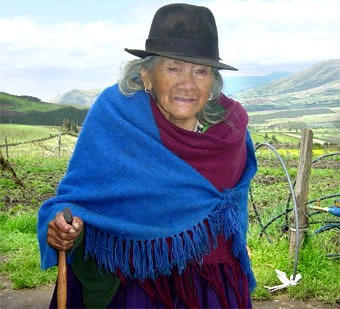1909 - 2009
Date Added:

TRÁNSITO AMAGUAÑA is still remembered and honored by many people across the world. Her parents worked in a "Hacienda" where they were given a "huasipungo," a piece of land within the hacienda that was not fertile and on a steep hill. The owners allowed many of their indigenous workers to live there for their own benefit. They made them work seven days a week with a horrible salary. Every year they would give them a sack of barley and in another year they would get a sack of potatoes, and the following year a sack of wheat. However, indigenous women had it worse since they were constantly being abused. The justice system that existed in these haciendas had a jail and with no way to protest. She experienced the harsh reality when she was young after her aunt, Patricia Amaguana was sentenced to death by the hacienda's owner because she had let a calf die. When she was ten years old she started working while attending school however, after only six months of school she had to drop put and became a maid for the hacienda's owner. At the age of 14 she was force to marry an older man in order to avoid being raped by men of the owner's family. After a year of being married she had her first child but her husband an alcoholic and abusive man ended up killing their child. When she was 21 years old she decided to separate from her husband and care for her two sons. She started her political activism at a very young age joining the Communist Party due to the hunger and abuse she had witnessed. Once the Unions were organized they went to three haciendas and presented their demands to the owners: " That the salaries be raised That the working week be only until Saturday That the working day be only of eight hours That the obligatory work and voluntary work (faena) be not on the same day That the owners return the part of land (huasipungo) That the taxes to the church and land owners be abolished That the forced domestic labor be abolished." They then went on a strike from January 1931 to March 1931. The landowners went to the government for help and hundred of military men were sent to look for the leaders of the union. Upon arrival they would destroy everything in their path including houses and arrested the leaders by tying them up and beating them. In 1931 indigenous people tried to organize the first National Indigenous Congress but were met by the governments troops that were trying to prevent the meeting from happening. However, after a lot of hard work and pressure some regulations for agricultural work were published in the labor Code (1936) and a Law for the Communities (1937) however, these laws were rarely applied. Women played a key role in the movement especially Transito who lived about 15 years in hiding. She would visit Quito by foot often washing her feet in streams she found along the way. In 1941 the foundation of the Ecuadorian Indio Federation, FEI was formed by many indigenous leaders that supported the Communist Party. The day they went to pick up Tranisto so that she could talk to Congress she "yelled first in Spanish, then in Kichwa, that the Law be just for white, for the rich, for the poor. That the indios are not put on one side. That the work be the same for everybody. That we may have friendships, that we work affectionately together." The FEI with the help of Transito accomplished many things like compensation for the houses that were destroyed earlier by the troops, higher wages for agricultural workers, and the abolishment of forced domestic labor and the church tax was also abolished because of Transito. During her activism she was jailed twice but continued to fight until she finally received official recognition for her life's work. In 2003 she was given the National Eugenio Espejo Prize from the Ecuadorian Ministry of Education and Culture. Transito died on May 10, 2009 a few days before her 100th birthday day and the President of Ecuador during that time attended her funeral and today many schools are name in her honor.
click hereShare your thoughts on this story with us. Your comments will not be made public.
Email
Copyright ©2016 - Design By Bureau Blank